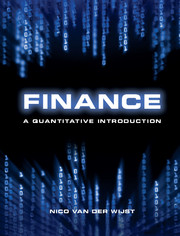Book contents
- Frontmatter
- Contents
- List of Figures
- List of Tables
- Acronyms
- Preface
- 1 Introduction
- 2 Fundamental concepts and techniques
- 3 Modern portfolio theory
- 4 Market efficiency
- Chapter 5 Capital structure and dividends
- 6 Valuing levered projects
- 7 Option pricing in discrete time
- 8 Option pricing in continuous time
- 9 Real options analysis
- 10 Selected option applications
- 11 Hedging
- 12 Agency problems and governance
- Solutions to exercises
- Glossary
- References
- Index
- References
4 - Market efficiency
Published online by Cambridge University Press: 05 February 2013
- Frontmatter
- Contents
- List of Figures
- List of Tables
- Acronyms
- Preface
- 1 Introduction
- 2 Fundamental concepts and techniques
- 3 Modern portfolio theory
- 4 Market efficiency
- Chapter 5 Capital structure and dividends
- 6 Valuing levered projects
- 7 Option pricing in discrete time
- 8 Option pricing in continuous time
- 9 Real options analysis
- 10 Selected option applications
- 11 Hedging
- 12 Agency problems and governance
- Solutions to exercises
- Glossary
- References
- Index
- References
Summary
In efficient markets prices change randomly. This is often misunderstood and can give rise to what Miller and Upton (2002) call the casino view of the stock market. In this view investors are gamblers whose buying and selling without apparent economic reason gives windfall profits to some and does random damage to others. The alleged casino nature of the stock market is often underlined by comparing graphs of stock price changes with graphs of random numbers, which are indistinguishable from each other. In this chapter we shall see that the opposite is true, that randomly changing prices are the hallmark of properly functioning markets. As we saw in Chapter 2, markets with properly organized price discovery processes aggregate all the information that buyers and sellers possess and that they reveal through their bidding and asking. As a result, prices in such markets will reflect all available information. By consequence, prices will only change if new information becomes available. But new information is random by nature, otherwise it would not be new. Hence, prices have to change randomly in efficient markets.
The concept of market efficiency
Market efficiency, or the efficient market hypothesis, is a deceptively simple concept. But its consequences are profound and not at all easy to understand or accept. We shall look at the concept from different angles and review some of the empirical evidence.
Information
- Type
- Chapter
- Information
- FinanceA Quantitative Introduction, pp. 96 - 135Publisher: Cambridge University PressPrint publication year: 2013
